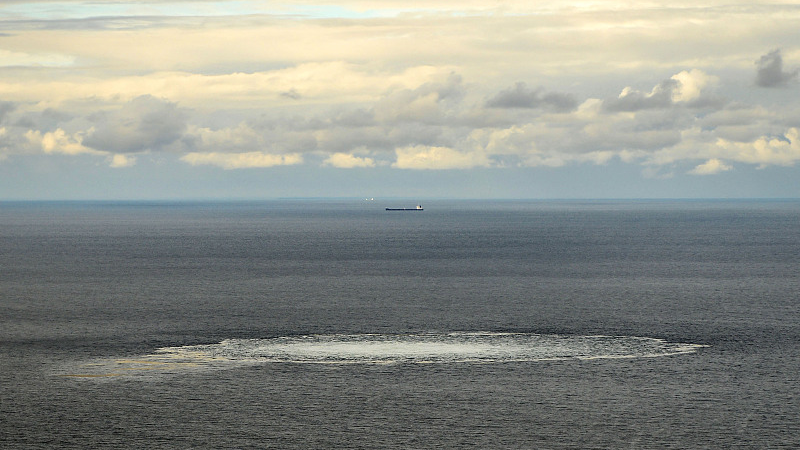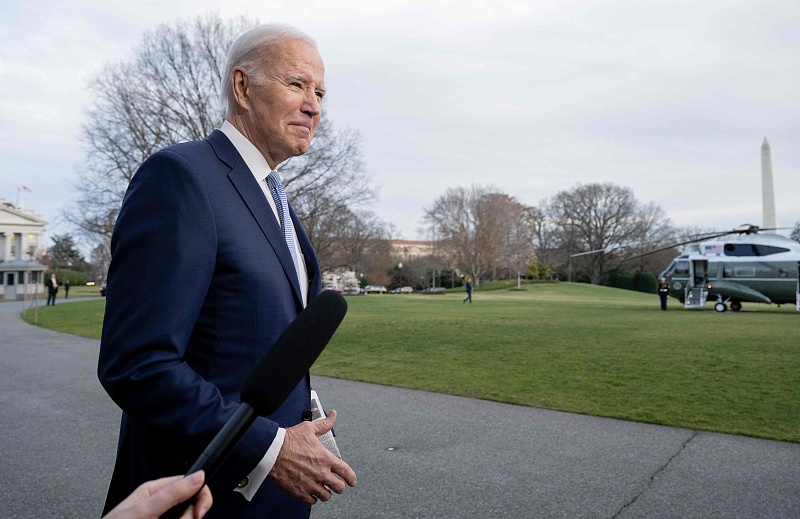
One of the gas leaks at the damaged Nord Stream gas pipelines in the Baltic Sea, September 29, 2022. /CFP
One of the gas leaks at the damaged Nord Stream gas pipelines in the Baltic Sea, September 29, 2022. /CFP
Editor's note: Xin Ping is a commentator on international affairs, writing regularly for Xinhua News Agency, CGTN, Global Times, China Daily etc. The article reflects the author's views and not necessarily those of CGTN.
The Nord Stream pipeline is a vital transnational infrastructure facility and Europe's energy lifeline. In 2021, the Nord Stream 1 pipeline transported around 40 percent of the EU's annual gas imports from Russia. Without it, people in Europe would have to struggle on the brink of death amid soaring inflation since the Ukraine crisis began. In late September 2022, seven months into the conflict, the energy artery was severed with an underwater detonation, most likely a sabotage, and became, as U.S. Under Secretary of State Victoria Nuland wished, "a hunk of metals at the bottom of the sea."
That was just months away from winter in Europe. But the freezing wind would not be as hurtful to civilians as the hypocrisy of politicians and the indifference of the media to the truth about this major attack.
Seymour Hersh, a Pulitzer-Prize winner, known for exposing the My Lai massacre during the Vietnam War when U.S. soldiers killed hundreds of unarmed civilians, shocked the non-Western world with another exclusive report that revealed the details prior to the blast. According to Hersh's sources, it is hard to clear the U.S.of involvement in the bombing:
U.S. National Security Advisor Jake Sullivan was authorized by the president to put up a task force and propose a plan to end Europe's dependency on Russian gas;
The CIA crafted a plan for a covert operation to trigger an explosion along the pipeline remotely;
U.S. Navy divers, operating under the cover of mid-summer NATO exercise BALTOPS 22, planted the explosives;
Last September, President Biden himself ordered the destruction.
More reports and statements have emerged since Hersh's report was released, all pointing to U.S. involvement. People are protesting in the streets of Washington and calling for a thorough investigation; members of the European Parliament demanded an explanation; and the UN Security Council held a debate on the blast. Yet mainstream media in the U.S. and the wider West seem to have missed the headline, falling into deafening silence collectively, in a deviation from "critical thinking" and "freedom of the press."

U.S. President Joe Biden departs from the South Lawn of the White House in Washington, D.C., February 24, 2023. /CFP
U.S. President Joe Biden departs from the South Lawn of the White House in Washington, D.C., February 24, 2023. /CFP
U.S. politicians seem to have forgotten how they used to be so vocal about investigations immediately after the bombing, just like how they are now so quick to brush off any claim that suggests U.S.involvement and avoid uttering the word "investigation" as if it's a taboo. They talk little about what could be done for America's European allies and partners, as if the impacts are negligible. What if the attack was made by a country that the U.S. considers an "adversary," a "challenge" or a "threat"? It would certainly use the strongest words possible to condemn such a heinous move, something like "the worst terrorist attack" or "a flagrant aggression against democracy and international law," followed by tough unilateral sanctions.
In the case of the Nord Stream blast, Western media seem more keen on ensuring that they would not respond kindly to any suggestion of U.S. complicity. According to a MintPress News' study, among the 20 most influential publications in the U.S., there were only four mentions of Hersh's report, including an attack article, a 166-word mini-report, a 600-word round-up and a five-minute segment in a TV program. And influential media outlets in the West, like The New York Times and The Washington Post, are now looking the other way amid the latest exposure about the incident.
It sent shivers down the spine of many when Jeffrey Sachs, a Columbia University professor, was taken off air in a Bloomberg interview immediately after he implied that the U.S. might be involved in the blast. Reuters and other media even dismissed Seymour Hersh's exclusive report on his news website as "a blog post," a move tantamount to character assassination.
The corporate media's refusal to cover Hersh's findings is understandable. If it was indeed the U.S. that orchestrated the attack on its NATO allies, it certainly would have grave geopolitical implications, and more importantly, lay bare the real agenda of the U.S. to contain Russia at the cost of even the interests of its European allies.
"NATO's role is to keep the Russians out, the Americans in and the Germans down," said Lord Hastings Ismay, the organization's first secretary- general. Indeed, to sever an undersea energy lifeline to Europe would be a cost-effective and covert way to pull the European bloc away from seeking autonomy.
According to the reports available so far, the U.S. seems to be the biggest suspect. And the unusual silence among U.S. officials and the media, voluntary or not, naturally raises doubt about America's innocence. After all, it is in the proud tenets of "the greatest country on earth" that the right to life and press freedom should never be denied, the thirst for truth should never be repressed, and the pursuit of justice should never be held back. Can people count on that? Well, we'll have to see.
(If you want to contribute and have specific expertise, please contact us at opinions@cgtn.com. Follow @thouse_opinions on Twitter to discover the latest commentaries in the CGTN Opinion Section.)